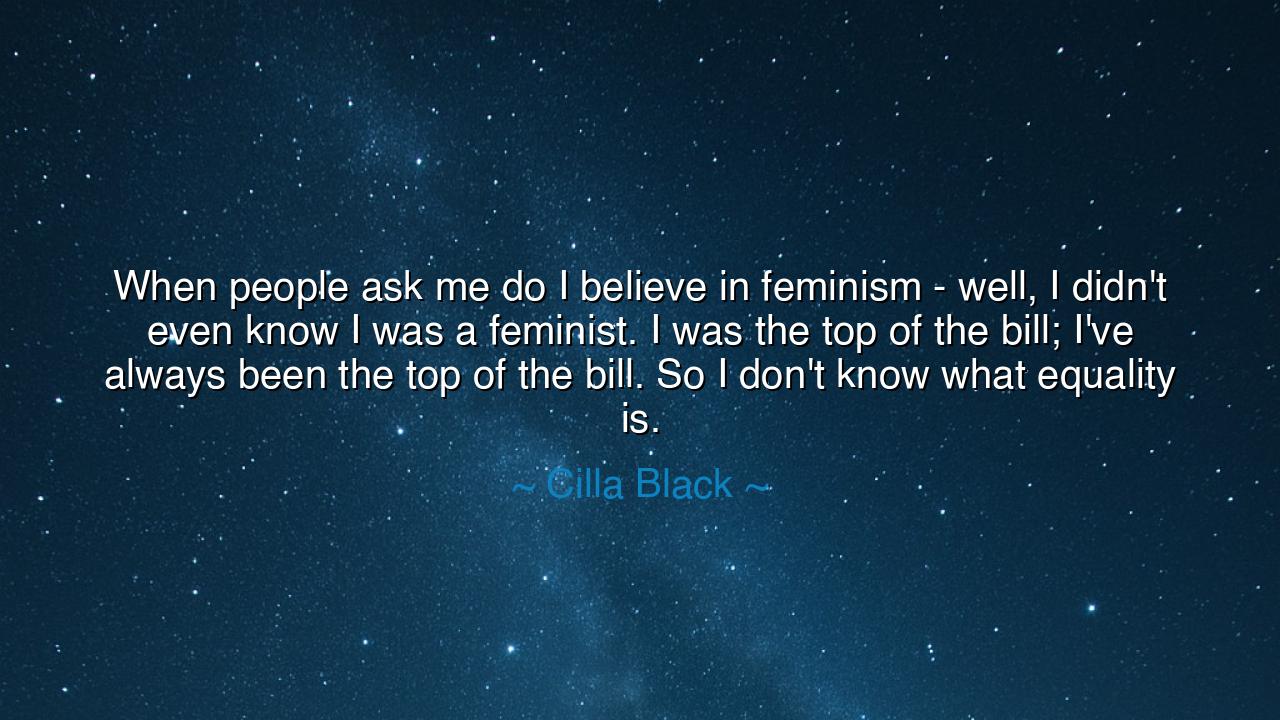
When people ask me do I believe in feminism - well, I didn't even
When people ask me do I believe in feminism - well, I didn't even know I was a feminist. I was the top of the bill; I've always been the top of the bill. So I don't know what equality is.






Hear, O listeners, the words of Cilla Black, the songstress who rose from Liverpool’s humble streets to dazzle the world. She declared with a voice both puzzled and proud: “When people ask me do I believe in feminism – well, I didn't even know I was a feminist. I was the top of the bill; I've always been the top of the bill. So I don't know what equality is.” In this saying lies both triumph and mystery, for she speaks as one who conquered stages and hearts without first naming the creed that carried her there.
The meaning of her words rests in this paradox: some women live the very ideals of feminism without ever knowing its name. To be “top of the bill” is to command the stage, to be celebrated above others, to prove that talent has no gender. Yet in her rise, Cilla Black did not see herself as one waging war for equality—she simply lived her life, sang her songs, and let her success silence doubt. For her, the chains of inequality seemed invisible, for she had already broken through them by the force of her presence.
This is the origin of her astonishment: to be asked if she believed in feminism was, to her, like being asked if she believed in breathing. Her life itself was a testament to the truth that women could rise, shine, and lead. But in her jest, “I don’t know what equality is,” she reveals the gulf between the lived experience of one extraordinary woman and the struggles of countless others. She, by rare fortune and rare strength, lived as if equality already existed, while many of her sisters were still fighting to be seen, heard, and valued.
Consider the story of Josephine Baker, the dancer who became a legend in Paris. Like Cilla, she rose to fame, adored by crowds and celebrated as “the top of the bill.” She did not call herself a feminist, yet by her very success she shattered boundaries of race and gender. But unlike Cilla, she also saw the stark inequalities around her—when she returned to America, she faced segregation, rejection, and scorn. Her fame had not shielded her from the truth: equality was not yet universal, and her triumph did not erase the struggles of others.
Thus, the teaching here is double-edged. On the one hand, Cilla Black’s words celebrate the power of individual greatness. She shows us that a woman may conquer the world without first embracing a banner, that action can speak louder than ideology. On the other hand, her words remind us that personal victory is not the same as collective freedom. To not know what equality is may be the privilege of those who live above its absence, but for most, the struggle remains.
The lesson is this: never belittle those who rise without the name of a movement, for their lives themselves may inspire more than their words. But also, never forget those who remain unseen. Celebrate the victories of the few, but labor for the liberation of the many. Feminism is not merely the triumph of the star upon the stage; it is the lifting of every woman, from the factories, the farms, the classrooms, and the kitchens, until all may know what it is to stand “top of the bill.”
So, children of tomorrow, carry this wisdom: live boldly as Cilla Black did, letting your gifts blaze without apology. But also open your eyes wider than she did—see the places where equality is yet unrealized, and lend your hand to the work of justice. Do not be content to shine alone; help others climb into the light. For only then will the words, “I don’t know what equality is,” cease to be a paradox, and become instead a universal truth, spoken not in ignorance but in joy, because equality has at last been made real for all.






AAdministratorAdministrator
Welcome, honored guests. Please leave a comment, we will respond soon